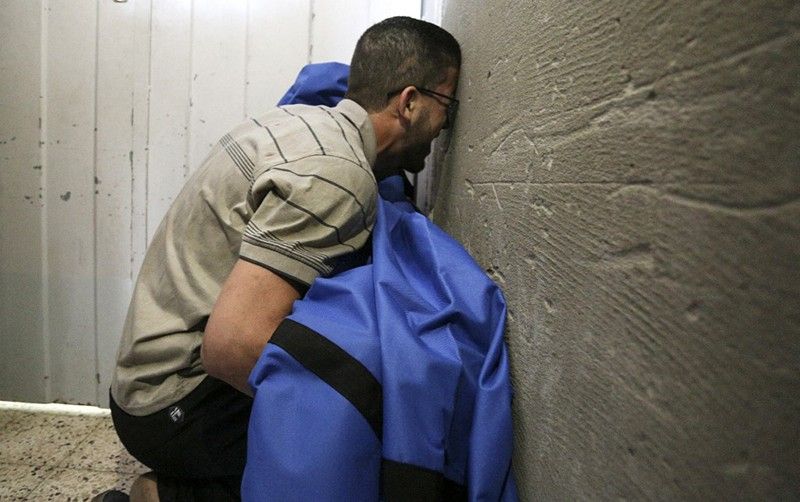In Gaza, fear of Israeli bombs outweigh COVID-19 risk

GAZA CITY, Palestinian Territories — Like thousands of others in Gaza, Umm Jihad Ghabayin fled home with her children from Israeli bombardment without taking any essentials -- let alone a facemask against the raging COVID-19 pandemic.
In response to rocket fire from Gaza, Israeli strikes have pounded the crowded Palestinian enclave since May 10, killing at least 219 people, according to Gaza's health ministry.
As entire tower blocks tumble, reduced to smoking rubble by bombs, the immediate danger of devastating air strikes has replaced for Gazans the less obvious -- but still deadly -- risk of COVID-19.
"Of course I'm afraid of catching coronavirus, but it will be easier (to cope with) than Israeli missiles," mother-of-six Ghabayin said.
"Missiles kill us," one of her children added, aged eight, his feet covered in dust.
Israeli air strikes have obliterated key infrastructure including water and electricity in Gaza, an impoverished and densely packed enclave home to some two million Palestinians.
After fleeing her home, Ghabayin has found shelter at a UN-supported school where she feels safer from strikes -- but acknowledges the risk of transmission of COVID-19 is high.
"Since we arrived on Friday, we haven't showered once," 34-year-old Ghabayin told AFP. "The water is cut off for hours, and there is a total lack of hygiene".
COVID-19 'epicentres'
In the schools-turned-shelters, and on Gaza's bomb-ravaged streets, few are thinking about wearing masks.
"Israel's continuing attacks are undermining our efforts against coronavirus," said Ashraf al-Qudra, Gaza's health ministry spokesman.
Gaza, under Israeli blockade since 2007, recorded few COVID-19 cases in the early months of the pandemic.
Access to the territory is tightly controlled by Israel and Egypt, and measures imposed by the enclave's Hamas rulers initially slowed the spread of the virus.
But in an impoverished society with poor health infrastructure, containing the virus proved difficult to control.
Before the military escalation, the rate of positive tests was among the highest in the world, at 28 percent, and hospitals were overwhelmed by patients.
The World Health Organisation says over 100,000 people have tested positive for coronavirus in Gaza, of whom over 930 have died.
Adnan Abou Hasna, a spokesman UN agency for Palestinian refugees, UNRWA, said that the schools transformed into shelters for the more than 40,000 displaced Gazans could become coronavirus "epicentres".
While hand-washing stations and other sanitary facilities had been set up, he admitted these measures were inadequate.
Unbearable
On Monday, Israeli strikes hit a clinic, the health ministry headquarters and the only laboratory in Gaza that was conducting COVID-19 tests.
Two doctors were also killed.
Before the military escalation between Hamas and Israel a week ago, authorities in Gaza tested an average of some 1,600 people per day.
Protecting medical infrastructure and health workers is an "imperative in all circumstances", World Health Organization chief Tedros Adhanom Ghebreyesus warned Monday.
"It is essential that international humanitarian standards are fully respected," he added.
The conflict is also hampering the vaccine rollout, with Gazans relying primarily on procurements from the West Bank-based Palestinian Authority, which must deliver stocks through Israeli territory.
The pandemic had already placed Gaza's health system under massive strain, now buckling as it tries to treat the more than 1,500 people injured by Israeli strikes, according to health ministry statistics.
Units previously dedicated to coronavirus patients have had to reorganise to cope with the influx of casualties.
Salem Al-Attar, 38, sheltering in a UNRWA school after his home was destroyed in a strike, said he feared the tightly-packed conditions could spread the virus swiftly.
"The situation is disastrous," he said, a father of six.
On the other side of school courtyard, Umm Mansour al-Qurum cried after receiving a phone call from a neighbour that half of her house had been destroyed in a strike.
"The situation is unbearable -- coronavirus and the war at the same time," said the 65-year-old, who fled the bombing with 30 members of her extended family. "I can't take it anymore".
- Latest
- Trending

































